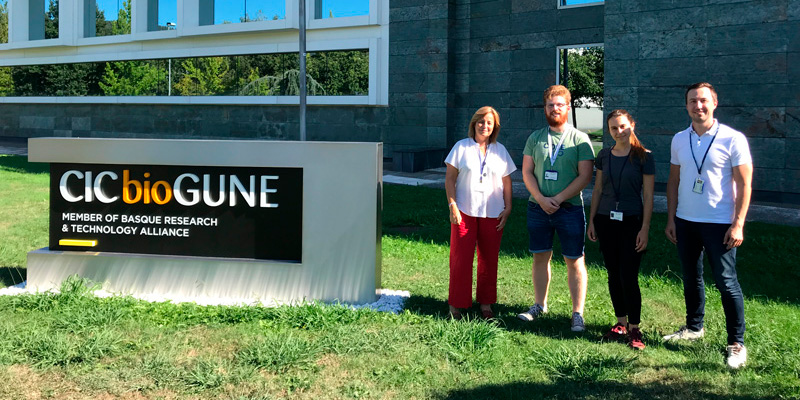
2022/09/07
A CIC bioGUNE study reveals the liver to be a target organ for SARS-CoV-2 infection
Steatosis increases vulnerability to infection by SARS-CoV-2.
Metformin, a treatment for hyperglycaemia in patients with type 2 diabetes, reduces infection of human hepatocytes by the SARS-CoV-2 pseudovirus.
The study has been published in the international journal Communications Biology, part of the Nature Publishing Group.
Severe acute respiratory syndrome coronavirus 2 (SARS-CoV-2) causes multi-organ damage, including liver dysfunction identified in more than 50% of Covid-19 patients. Liver damage in Covid-19 patients could be attributed to cytopathic effects induced by the interaction between the virus and liver cells, to an increased immune response or to drug toxicity associated with the treatment of these patients, according to research carried out at CIC bioGUNE.
The study, led by the Liver Disease Laboratory of Dr. Malu Martínez Chantar (CIC bioGUNE; Centre for Network Biomedical Research on Liver and Digestive Diseases [CIBEREHD]), and the Cancer Immunology and Immunotherapy Laboratory of Dr. Asís Palazón (CIC bioGUNE and Ikerbasque and ERC researcher), has shown that primary human hepatocytes are susceptible to infection by SARS-CoV-2 pseudoviral particles. This infection triggers metabolic reprogramming in the liver cell, with a deterioration of mitochondrial activity and an increase in liver damage compatible with that observed in Covid-19 patients in the clinic.
"In the context of non-alcoholic steatohepatitis (NASH), primary human steatotic hepatocytes are more vulnerable to infection. Metformin, one of the most common therapeutic options for the treatment of hyperglycaemia in patients with type 2 diabetes (T2D), reduces the infection of primary human hepatocytes by the SARS-CoV-2 pseudovirus," Drs. Martínez Chantar and Palazón explain.
This work, conducted in collaboration with the University of the Basque Country (UPV/EHU), the Carlos III Health Institute, Hospital La Fe (Valencia), the University of Valencia, the Centre for Research in Molecular Medicine and Chronic Diseases (CiMUS) and the University of Lille (France), has been published in the international journal Communications Biology, part of the Nature Publishing Group and one of the highest profile journals in its field. The first authors are researchers Maria Mercado-Gómez and Endika Prieto-Fernández (CIC bioGUNE).
About CIC bioGUNE
The Center for Cooperative Research in Biosciences (CIC bioGUNE), member of the Basque Research and Technology Alliance (BRTA) and located in the Bizkaia Technology Park, is a biomedical research organization conducting cutting-edge research at the interface between structural, molecular and cell biology, with a particular focus on the study of the molecular bases of disease, for use in the development of new diagnostic methods and advanced therapies.
CIBER (Consortium of Biomedical Network Research Centres) is part of the Instituto de Salud Carlos III/ Carlos III Health Institute of the Ministry for Science, Innovation and Universities, and is co-funded by the European Regional Development Fund (ERDF).
About Ikerbasque
Ikerbasque - the Basque Foundation for Science - was created as the result of an initiative of the Basque Government Department of Education to further strengthen its commitment to scientific research by attracting, bringing to the Basque Country and subsequently consolidating excellent researchers from all over the world. Today, Ikerbasque is a consolidated organization with 290 researchers working in all fields of knowledge. https://www.ikerbasque.net
About the BRTA
The BRTA is an alliance made up of 4 collaborative research centers (CIC bioGUNE, CIC nanoGUNE, CIC biomaGUNE and CIC energiGUNE) and 12 technology centers (Azterlan, Azti, Ceit, Cidetec, Gaiker, Ideko, Ikerlan, Lortek, Neiker, Tecnalia, Tekniker and Vicometch), with the aim of developing advanced technological solutions for Basque companies.
With the support of the Basque Government, the SPRI Group and the Provincial Councils of the three regional provinces, the alliance seeks to promote collaboration among its centers, to strengthen the conditions to generate and transfer knowledge to companies, contributing to their competitiveness, and to spread Basque scientific and technological capacity outside of the Basque Country.
BRTA has a staff of 3,500 professionals, accounts for 22% of the Basque Country’s R&D investment, generates an annual turnover of over EUR 300 million and files 100 European and international patents per year.
See a large version of the first picture





